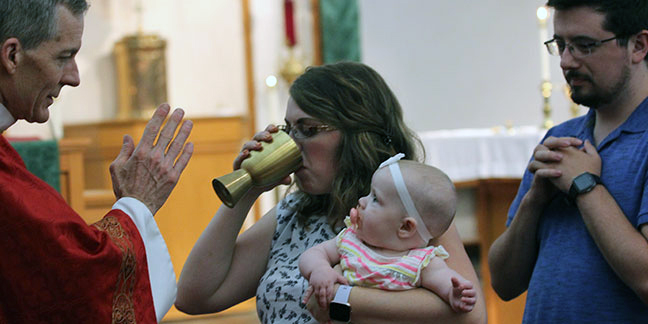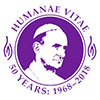CHARLOTTE — The Diocese of Charlotte Lay Ministry Formation Program, a two-year formation program for laity, will begin a new session this September.
The Lay Ministry Formation Program is designed to help Catholics better understand their faith so they may better respond to their baptismal call to participate in the Church’s mission. This program is designed for adults at all levels – anyone who may be interested in serving the Church or who simply wants to deepen their understanding of Church teachings, scripture, theology and authentic spirituality.
Through the formation program, which follows the academic year and is comprised of 150 class hours, participants will develop their skills and abilities to become more efficacious signs of Christ’s presence among all of God’s people.
Participants will:
- appreciate and understand more fully that they are called to and gifted for the lay apostolate by virtue of their baptism and confirmation,
- be affirmed and grow in competence and confidence in their present ministries to and with others: the Church, their families and the community,
- explore their personal gifts and how those gifts may be used in response to their baptismal call, and
- grow in their Catholic faith
There are five proposed sites for the 2018-’20 English program (based on a minimum number of participants): Arden, Charlotte, Greensboro, Lenoir and the Smoky Mountain region. Classes will meet on designated Saturdays from 9:30 a.m.-4 p.m. with an hour for lunch. Sessions average about one every three weeks within the academic year.
There are two proposed sites for the 2018-’20 Spanish program (based on a minimum number of participants): Charlotte and Hendersonville. Classes will meet 6:30-8:30 p.m. Thursdays in Charlotte and 7-9 p.m. Fridays in Hendersonville.
Participants must be registered at a parish, provide a letter of recommendation from their pastor, commit to actively practicing their Catholic faith, and agree to begin praying at least one hour of the Liturgy of the Hours daily as a part of their regular, planned prayer life.
— SueAnn Howell, senior reporter
For details
For more information and to enroll in the Lay Ministry Formation Program, call Frank Villaronga, diocesan director of evangelization and adult education, at 704-370-3274 or go online to www.charlottediocese.org/ev/adult-education.
 CHARLOTTE — “We celebrate ‘Humanae Vitae’ because it is a great document giving insight and depth to human sexuality and to human nature itself,” Father Joshua Voitus said in the opening words of his homily at the 50th anniversary Mass celebrated July 25 at St. Vincent de Paul Church.
CHARLOTTE — “We celebrate ‘Humanae Vitae’ because it is a great document giving insight and depth to human sexuality and to human nature itself,” Father Joshua Voitus said in the opening words of his homily at the 50th anniversary Mass celebrated July 25 at St. Vincent de Paul Church.
The encyclical written by Blessed Paul VI was met with cheers and also jeers when it was published July 25, 1968.
In the encyclical, Blessed Paul said that the only licit means of regulating birth is natural family planning. In the document, he asked scientists to improve natural family planning methods “providing a sufficiently secure basis for a regulation of birth founded on the observance of natural rhythms.”
Blessed Paul issued “Humanae Vitae” as artificial contraception, particularly the birth control pill, began to become commonplace.
Read our complete 50th anniversary package: 'Humanae Vitae' said rooted in respect church has for human dignity.
He also predicted that if its message was not heeded there would be dire consequences: the devaluing of human love, the devaluing of human sexuality, and strained, broken relationships.
“We celebrate tonight because in the world at large, the message has not been heeded,” Father Voitus said. “In the world at large it has been largely ignored, spurned and ridiculed. Those dire consequences have indeed come to pass in our own day.
“So our celebration is somewhat bittersweet.”
The document’s controversial reception is a great shame and a tragedy, he continued.
“The fact that the document became a source of fighting and conflict – a source of great bitterness throughout the world – it prevented it for being seen for what it truly was,” a beautiful document that teaches people about the beauty and depth of human nature and the beauty and depth of human love, he said.
Human love is meant to be about the love between a man and a woman, reflecting the self-giving love between God and His Church.
This teaching should have filled the whole world with light, joy and happiness, Father Voitus said. Instead, the document became a source of conflict, tension, bitterness and fighting over the past five decades.
“We’re here tonight to recommit ourselves to love, to recommit ourselves to this idea of human love mirroring divine love, a love that is self-giving, withholding nothing. A love that is sacrificial, willing to suffer, willing to die for the other, willing to give the whole self for the other."
A couple striving to live the spirit of “Humanae Vitae” are Shawn and Riley Provost.
Riley was recently hired as the new faith formation director at St. Vincent de Paul Parish. They were at Mass with their 6-month-old daughter Bentley.
The couple, married for almost two years, studied “Humanae Vitae” at Franciscan University in Steubenville, Ohio. They said it has played a huge role in their marriage.
“We have definitely been able to implement it in our marriage,” Riley Provost said.
Shawn Provost said Father Voitus’ homily was a great reminder to “make sure that our love spreads from our family out into the community.”
When asked about how large of a family they are considering, Riley Provost replied, “As big as God wants it.”
Susan Brock, wife and mother of eight children, brought her family to Mass to mark the 50th anniversary of “Humanae Vitae.”
“I think being open to God and knowing the truth has made our marriage what God intended it to be,” Brock said. “Anything that comes from God is good and fruitful. Our marriage has obviously been fruitful. I can say it has been good.”
In the closing remarks of his homily, Father Voitus encouraged those gathered to recommit to this idea of human love mirroring divine love.
“We should allow ourselves to bask in this love of God. We should allow ourselves to be reminded that although 'Humanae Vitae' has great value, and although it is this great mirror of God and tells us of the love of God, it is no surprise it creates conflict – for so does Christ, so does the preaching of the Gospel wherever it goes,” he noted.
“Tonight in this temple of God we should take this opportunity not to fight, but to bask in the love of God, bask in the self-sacrificial love of God and recommit ourselves not just to the fight but to love. To love one another with that divine love of God. To love God with all our heart, mind and strength. To remind ourselves that is why we are in it.
“We are here because we are fighting for love,” he said.
— SueAnn Howell, senior reporter

















